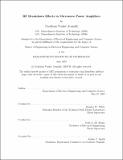RF breakdown effects in microwave power amplifiers
Author(s)
Arumilli, Gautham Venkat
DownloadFull printable version (623.3Kb)
Alternative title
Radio frequency breakdown effects in microwave power amplifiers
Other Contributors
Massachusetts Institute of Technology. Dept. of Electrical Engineering and Computer Science.
Advisor
Douglas W. White and Jesús A. del Alamo.
Terms of use
Metadata
Show full item recordAbstract
Electrical stresses in the transistors of high-efficiency switching power amplifiers can lead to hot-electron-induced "breakdown" in these devices. This thesis explores issues related to breakdown in the Transcom TC2571 PHEMT, and the effects this has on the Draper Laboratory 2.3 GHz microwave power amplifier in which the transistor is used. Characterization of breakdown was performed under DC and RF drive conditions, and shows the surprising role of impact ionization at low temperatures in DC off-state breakdown, as well as the apparent prevalence of on-state breakdown under RF drive. DC characterization shows that breakdown walkout and recovery both proceed more quickly at higher temperatures, and also shows that breakdown stress might lead to the permanent creation of traps that degrade breakdown voltage. Walkout under RF drive decreases amplifier gain at lower levels of RF input drive, but appears to have no negative effect on amplifier saturated output power. The use of temperature-compensated input drive and a diode to clamp negative gate voltage swing are also explored as circuit design techniques that can mitigate device degradation due to breakdown stress.
Description
Thesis (M. Eng.)--Massachusetts Institute of Technology, Dept. of Electrical Engineering and Computer Science, 2007. This electronic version was submitted by the student author. The certified thesis is available in the Institute Archives and Special Collections. Includes bibliographical references (p. 95-98).
Date issued
2007Department
Massachusetts Institute of Technology. Department of Electrical Engineering and Computer SciencePublisher
Massachusetts Institute of Technology
Keywords
Electrical Engineering and Computer Science.